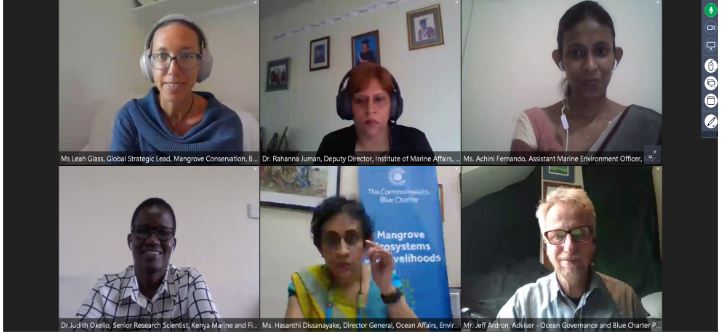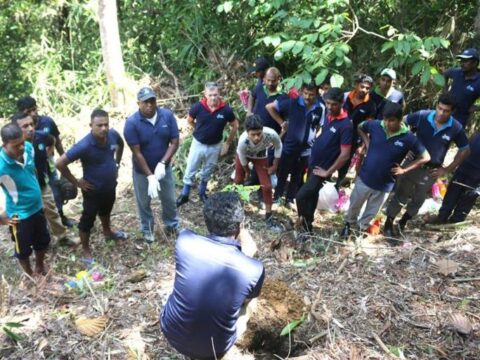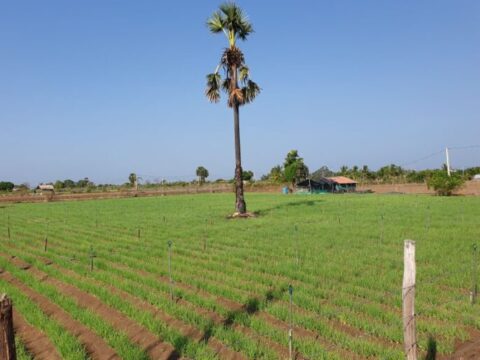COLOMBO: As the lead country of the Commonwealth Blue Charter Action Group on Mangrove Ecosystems and Livelihoods, Sri Lanka together with the Commonwealth Secretariat recently organised a webinar titled “Commonwealth Blue Charter Webinar: Unlocking the Wealth of Mangrove Ecosystems” to mark the International Day for Conservation of Mangrove Ecosystem.
The International Day for the Conservation of the Mangrove Ecosystem, adopted by the General Conference of UNESCO in 2015 and celebrated each year on 26 July, is aimed at raising awareness of the importance of mangrove ecosystems as “a unique, special and vulnerable ecosystem” and to promote solutions for their sustainable management, conservation and uses.
Between 30 – 50% of mangroves have been lost over the past 50 years. New approaches to restoration of mangroves are emerging, benefiting from new, low-cost technologies and support the resilience of local communities through empowered engagement and innovative funding.
The webinar focused on provide an overview of the science and policy adopted by different nations to gather information required for better management of mangroves, showcase learning through case studies from projects across the Commonwealth representing different regions and highlight the various platforms available to move forward in post COVID-19.
The webinar was moderated by Jeff Ardon, Adviser, Ocean Governance and Project Lead, Commonwealth Blue Charter at the Commonwealth Secretariat and the opening remarks focusing on Commonwealth Blue Charter, progress of the Commonwealth Blue Charter Action Group on Mangrove Ecosystems and Livelihoods and the significance of the International Day for Conservation of Mangrove Ecosystem was delivered by Hasanthi Urugodawatte Dissanayake, Director General, Ocean Affairs, Environment and Climate Change of the Ministry of Foreign Relations of Sri Lanka.
 Dr. RahannaJuman, Acting Director of Institute of Marine Affairs of Trinidad and Tobago presented a case study on “Restoration of a Mangrove System in Point Lisas” analysing the lessons learnt from the interventions for restoration as opposed to natural regeneration.
Dr. RahannaJuman, Acting Director of Institute of Marine Affairs of Trinidad and Tobago presented a case study on “Restoration of a Mangrove System in Point Lisas” analysing the lessons learnt from the interventions for restoration as opposed to natural regeneration.
Identifying degradation of mangrove ecosystems scientifically and community perceptions and how both processes contribute in restoration was the emphasis of the presentation of Dr. Judith Okello, Senior Research Scientist of Marine and Fisheries Research Institute of Kenya.
Ms. Achini Fernando, Assistant Marine Environment Officer of the Marine Environment Protection Authority of Sri Lanka delivered a presentation on “Mangroves everywhere: No two stands similar” highlighting the diversity of true mangrove species in Sri Lanka, level of vulnerability of species and the importance of data for evidence-based management. Leah Glass, Global Strategic Lead, Mangrove Conservation of Blue Venture from the UK presented empowering coastal communities and averting climate breakdown through “The Blue Forest Initiative” launched in Madagascar and Indonesia, synergizing blue carbon and mangrove management, fisheries, alternative livelihoods and community health.
The webinar, which was attended by over 100 participants and 20-minute, was followed by a Q & A session.
The Blue Charter helps Commonwealth countries work together on a fair, inclusive and sustainable approach to ocean protection and economic development. The Charter works through a set of Action Groups, dedicated to a particular ocean issue and are driven by member ‘Champion’ countries. So far 13 countries have stepped forward to be Champions on 10 themes. Mangrove Ecosystems and Livelihoods Action Group (MELAG) , is one such Action Group, and is led by Sri Lanka. Current members of this Action Group are Australia, Bangladesh, Bahamas, Jamaica, Kenya, Nigeria, Pakistan, Sri Lanka, Trinidad and Tobago, the United Kingdom and Vanuatu.
Sri Lanka as the ‘Champion’ country for mangroves, already has formulated a mangrove policy, guidelines, a multi-stakeholder task force and an expert group on mangroves, established the world;s first mangrove museum and enacted laws to restore mangrove forests which have been converted to other uses.




